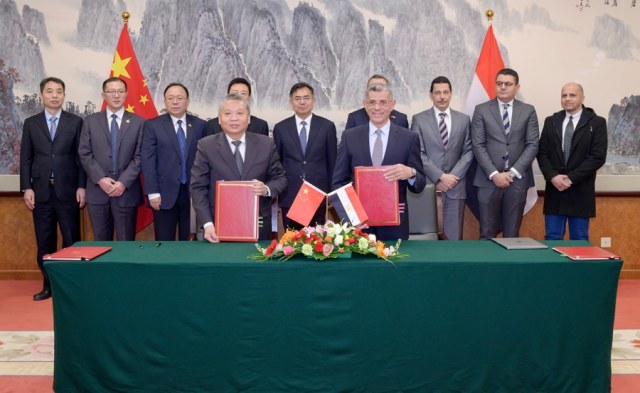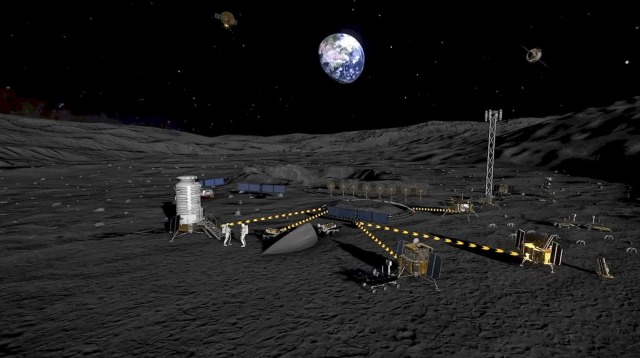China and Egypt have signed several documents at once, consolidating the cooperation of both States in the exploration of outer space. One of the most important is the agreement on participation in the international lunar station project. The Celestial Empire is trying to attract as many partners as possible to this initiative, forming a kind of counterweight to the American "Artemis Agreements".
Representatives of the Chinese National Space Administration (CNSA) and the Egyptian Space Agency (EGSA) met last Wednesday, December 6. The documents on cooperation were signed by the heads of the organizations — Zhang Kejian and Sherif Sedky. In addition to the agreement on participation in the International Lunar Research Station (ILRS) project, Egypt and China have signed a Memorandum of Understanding between the countries on the peaceful use of space.
The package of documents signed by officials of the two states describes a whole range of relationships related to space exploration. Among them: joint exploration of the Moon and deep space, astronomy, space experiments, the development of spacecraft and related infrastructure, the launch of satellites and the processing of data obtained with their help.
This meeting of the space agencies of both countries is a logical next step in their cooperation. A few days before it, the Celestial Empire launched the Misrsat-2 satellite in the interests of Egypt. Remarkably, this device was built at the expense of Chinese financing. And its partial development, testing and preparation for launch were carried out at the Cairo Satellite Assembly, Testing and Integration Center (AIT or AITC), a scientific and engineering complex that China built for Egypt in 2019.
 |
| The signing ceremony of the agreements by the heads of CNSA and EGSA. Zhang Kejian on the left, Sheriff Sidki on the right. |
| Source: CNSA |
Egypt became the first Arab country and the second State on the African continent to agree to participate in the ILRS project. The SpaceNews portal, describing the news, asked for the opinion of several experts in the field of Chinese cosmonautics and Sino-Egyptian relations. In general terms, they describe the signing of agreements between Egypt and China as the entry of the Celestial space industry into the Arab world. In addition, it seems that the Chinese government is gradually retreating from the early strategy of doing all the work on its own and plans to further share its experience with partners and help them educate their technical specialists.
"An alternative to Artemis"
In the spring of 2020, the administration of US President Donald Trump announced the creation of an international agreement regulating the use of the Moon and its subsoil. The document caused a mixed reaction from other countries. On the one hand, this is the first document in more than half a century that contains not amorphous intentions "for all good, against all bad", but important from a practical point of view, the scope of permissible actions and ways to resolve possible conflicts. On the other hand, the "Artemis Agreements" made other international documents under discussion and ratification virtually obsolete.
Since then, three dozen participants have joined the American initiative and the list is constantly being updated. For those countries that are actively engaged in space exploration, this document looks convenient for several reasons at once. Firstly, it is tied to the actively developing Artemis program, which, albeit with delays (and when it was otherwise), has every chance to deliver people to the Moon in the foreseeable future. Being a participant in a realistic space program is always advantageous. Secondly, this is the first serious advance in the field of space law in a long time. Regardless of the degree of success of the Artemis Agreements, their use will lay a solid foundation for further settlement of legal issues of extraterrestrial research.
Finally, and thirdly— politics. Anyway, the United States and its aerospace partners have no alternative to dominating the new lunar race. This is a relatively cheap way not only to get involved in the most important technologies in the 21st century, but also to indicate loyalty in the international arena. This factor is most likely the reason for the active criticism of the "Artemis Agreements" by some states. China was among them, but the country's government went beyond criticism. Realizing the importance of such initiatives, the Celestial Empire has formed a similar document, also linking it to the actively worked-out Moon exploration project.
By December 2023, the Chinese "alternative" to the Artemis Agreements, in addition to the Celestial Empire itself, includes seven states and six organizations from other countries — commercial firms, institutions, NGOs. The result is modest compared to Western successes, but politically significant. An interesting fact: in many sources, the United Arab Emirates is listed among the participants of the ILRS, although the country has not officially announced the signing of any agreements with China at the highest level. Instead, the private Emirati University of Sharjah joined the project of the International Lunar Research Station a few weeks ago. Given that the UAE had previously officially signed the Artemis Agreements, the country has every chance to become an international negotiator in the space sector.

